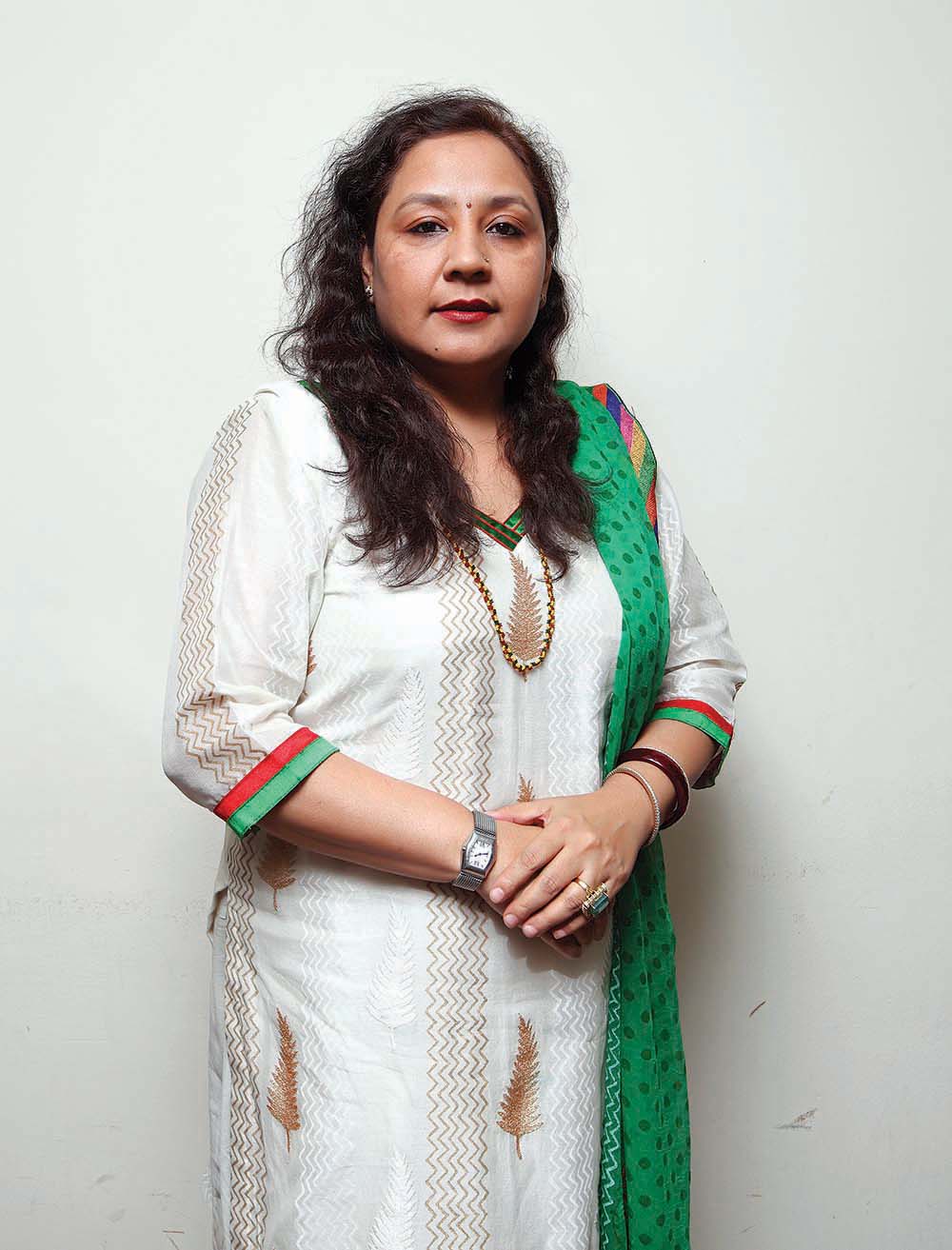
Whether it is the corporate or banking sector, women were hardly seen in leadership positions until a few years ago. Changes are happening but it’s a slow and gradual process. Anupama Khunjeli, CEO of Mega Bank, is one of the few women, who holds an influential position in the banking sector. She feels fortunate to be in a position that now allows her to not only be a role model but to actually encourage and create processes that will allow more women to take lead. “I believe our board members made an effort to break the glass ceiling by putting a female CEO at the top. We see that most board committees in Nepal comprise of men, that was a challenge which they thought was worth taking and today it has been four years,” she states. Twelve years ago, female participation at Mega Bank was about 60%. However, it went down to 43% after various mergers. Currently, 50% of the senior management positions of the bank consists of women.
“The corporate world has definitely seen considerable progress in terms of gender parity at the workplace. Despite these small steps toward gender parity, women continue to face significant barriers to enter into leadership roles. Moreover, gender parity for all women remains elusive at the workplace,” mentions Gaurav Sharda, Director of Sharda Group.
In an increasingly competitive world, women are steadily chipping away the patriarchal obstacles that hinder their career growth despite them being equally if not better qualified for the job. “This change makes me feel that we will see more women in leadership positions in the future. Not only that, for this change to happen, families need to support their daughters to get educated and become independent before getting married. And after marriage, unless and until you have the support from your husband and in-laws, it is very difficult to reach the topmost position,” states Khunjeli.



Anupama Khunjeli
CEO, Mega Bank
Sharda thinks though women are graduating with relevantly higher degrees and entering focused careers, the main reason behind the lack of women in leadership positions is their role in society. “Their lives are centred on their traditional roles of managing the house. Women’s stand in society is mostly contingent on their spouse and parents’ economic and social positions. The gap is due to retrogressive cultural practices and the patriarchal nature of our society in Nepal,” he elaborates. On the same note, Khunjeli says, “Women finish their education and are married off, maybe they will get an opportunity to continue with their work up to an officer level position, but by that time you are meant to start a family and have additional responsibilities of rearing children. However, a man does not have to worry about any of these things so it’s easier for them to rise higher faster.” To promote women, Mega Bank has started a programme called ‘Education is Enlightenment’, where each branch makes sure that they support two girl students. Currently, they are supporting the education of 440 girls. The plan is that they will come for training after their schooling, and will be given preference to work in the bank itself where possible. The bank also supports women entrepreneurs by giving them loans. “If women are educated, they will definitely take these opportunities where they will get loans at lower interest rates. The goal is that graduates of Nepal move towards some form of generating employment and create some sort of business to support themselves as well as create jobs for the country,” says Khunjeli. There is empirical evidence that in any organisation led by a woman the profits and ethical standards are higher. “It is extremely important to promote women in leadership roles in all organisations. The benefits of diversity and gender parity in leadership and decision-making should not be underestimated. Women provide imaginative perspectives, different skill sets, cultural and structural differences that enhance the working of any organisation. Empowering women will bring about better results,” Sharda states. At the workplace, women add value to the work culture in the organisation. “Women are straightforward, they are honest and integrity matters a lot to them. They have a lot of patience and it is reflected in the workplace as well. Women have the capacity to work with a team and don’t have an individualistic approach. When you are a team player, that is a valuable addition to the company and women are a little bit more compassionate as compared to men,” says Khunjeli. Sharda adds, “When it comes to accomplishing goals or building a solid workplace relationship, the feminine touch and skills like empathy, intuition and optimism that women bring onboard greatly benefits any organisation.” Many organisations have started acknowledging the significance of women as leaders unlike in the past, he says, adding, “Many women lead big corporations in the contemporary setting, employers have started advancing and appreciating the positive impact of women as leaders but frankly, there is much more to be done in the Nepali context.” In the three decades that Khunjeli has been working, she has seen several changes and it is certain that there is more to come. Looking back, it has not been easy for women. She says, “For me, it has not been an easy journey but when we fail, we should try and bounce back as soon as possible. There will definitely be ups and downs, hurdles and moments where you might think ‘enough is enough’, but I believe failures are the stepping stones to success.”“Women are straightforward, they are honest and integrity matters a lot to them. They have a lot of patience and it is reflected in the workplace as well. Women have the capacity to work with a team and don’t have an individualistic approach. When you are a team player, that is a valuable addition to the company and women are a little bit more compassionate as compared to men."

Gaurav Sharda
Director, Sharda Group
For every individual, the only competition should be with yourself, states Khunjeli. “I have rarely felt sad to wake up in the morning and come to the office. Each individual needs to understand what they are passionate about, what makes them tick, that is what will take you to success.” “I am very lucky that my teammates have been my strength, we started off with 80 staff members and now we are 1,850. We have grown phenomenally in the past 12 years, but it is entirely team effort,” she adds. Sharda believes in fair competition and does not believe in any form of reservations especially at the workplace, though there still exists a huge disparity in education and opportunities between boys and girls in Nepal. “Granting a reservation at the workplace cannot be a permanent solution to the problem of patriarchy, and reservation would only bring down the competitive attitude in many,” he explains. Women need to be empowered from a much younger age by giving them the right to proper education and to mould and groom them to define their personality, to make them independent and the masters of their own destiny, believes Sharda. Khunjeli, on the other end, believes that women do need reservation. “After an equilibrium has been reached, then it will not be necessary but until then, we need it. The gap is there worldwide, and in order to change that scenario some sort of differentiation is required,” she says. Sharda concludes by saying, “Gender equality should be viewed as a business imperative that increases profitability, not as an initiative. The need of the hour is to encourage awareness and conversation on gender equality at workplaces and also to walk the talk.” He adds that both the private and public sector need to address the skill gap and also implement practical changes driven from the top-down, that will not only attract but also develop women to take on leadership roles. “We need to prioritise gender equality, create a culture that supports it, a system that measures progress and creates leaders who adhere to it.” READ ALSO:“Women’s stand in the society is mostly contingent on their spouse and parents’ economic and social positions. The gap is due to retrogressive cultural practices and the patriarchal nature of our society in Nepal."
Published Date: March 28, 2022, 12:00 am
Post Comment
RELATED Feature

-1765706286.jpg)
-1765699753.jpg)

